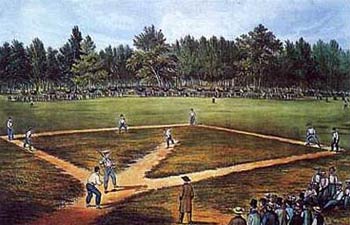
How Baseball Changed My Life
by Marcy Sheiner
I’m sitting in a sports bar in San Francisco, across from Pacific Bell Park, watching the Giants on big-screen TV because a flat tire prevented me from arriving in time to get tickets to the game. Barry Bonds, going for a record this summer, is up at bat, and for the second time today the pitcher intentionally walks him. I lead the assembled spectators in a round of heartfelt boos.
Perched atop my head is my New York Yankee cap—you can take the girl out of New York but you can’t take away the Yankees. Besides, whenever I venture out in this particular head covering, I never fail to capture male attention. "Paisan!" one ex-New Yorker shouts at me. "Fuggedaboudit," jokes another. Only the young and humorless berate me for what they perceive as a lack of loyalty to the home team.
Five years ago if anyone had told me I’d be walking around in a baseball cap, cheering, booing and citing statistics, I’d have thought they were nuts. Then, and for most of my adult life, I was an ardent sports-hater. I’d been married to a man who watched every televised sport imaginable: not just basketball, football, and baseball, but also hockey, golf and bowling. He’d lie on the couch on Sundays demanding salami sandwiches, polluting my home with unseemly masculine noises, while I simmered with resentful fury. After all, I was a Jewish girl whose hatred of athletics was such that I almost didn’t graduate high school for failing Phys. Ed.. Add to this the fact that I wasn’t particularly fond of the man on the couch to begin with, and you get the picture.
When the Women’s Liberation movement came along, I found theoretical foundation for my antipathy to balls. Sports formed the heart of male culture, with all its violence and fierce competition. Sports sucked money from the mouths of women and children—fuzzy math, but early feminism was fuzzy with the details. I left the man on the couch, and my son grew up watching ball games with the sound turned off.
I’m here now to say that I was wrong—more wrong about this than I’ve been about almost anything in my life. In my middle years I’ve been re-educated. No, more: I’ve been rejuvenated. Baseball has done for me what trophy wives do for older men—rescued me from the depths of midlife crisis. Some people go bungee jumping. Others embark on new careers. I looked around to see what was available, and found a rich resource in my fanatical son. I asked him to teach me the game.
A flood of childhood memories came over me the first time I watched a ball game with my son: pretending to be sick so I could stay home from school with the radio, the announcer telling me what Mickey Mantle was doing. Trading baseball cards with the neighborhood kids. Going to a game with my dad, whose round red cheeks lit up every time Maris hit the ball. Yankees versus Dodgers—I equated the race with presidential elections, and though our family were staunch Democrats all, the elitist Yanks were our team. My son wants me to root for the Mets—but the Yankees are in my blood; I just can’t betray them.
Besides memories, I discovered what else the game had to offer—what was always, incredibly, there, free for the taking. At a time in life when I’ve become jaded about the capacity of human beings to surprise or delight me, talking baseball to perfect strangers is my favorite pastime. On the bus or the train, in a bar or on the street, in the workplace or a doctor’s waiting room—I can open a conversation about baseball and within a few minutes actually come to like a person who only moments ago was annoying the shit out of me by coughing or loudly talking on his cell phone. Riding to a game in a train full of fellow fans, I strike up conversations with kids, teenagers, elderly folks.
Recently I had a huge fight with my family, and hopped into a taxi to escape. Sobbing in the back seat, I dialed my cell phone trying to find a friend to talk to, but it was a sunny Saturday afternoon and all I got were answering machines. Putting the phone away, I became aware of a ball game on the driver’s radio; I wiped my tears, stifled my sobs, and asked him who was playing. For the remainder of the drive we talked baseball, and by the end of the journey my mood had brightened considerably.
Baseball can make or break my day. When I know I’m going to see Roger Clemens pitch seven innings, I wake up happy. When my team wins—which is most of the time—I’m elated. My son, a diehard Mets fan, is unhappy with the outcome of games much more often than I am; I tell him, look, it’s a choice, you wanna be happy, root for the Yankees. I know, I know: the Mets are the scruffy underdogs, the team someone like me would naturally give my heart to—but my heart belongs to enough underdogs already. I mean, Clinton is the only Presidential candidate I ever voted for who won. I’ve campaigned for George McGovern, Jesse Jackson, and a host of lost causes. So while some friends tease me about my devotion to the Yankees, the big-money team, as being "politically incorrect," I tell them, look, in this one area of life, let me be a winner.
In actuality, I would feel like a winner no matter which team I rooted for. Being a Yankee or Met or Orioles fan is purely arbitrary. The day I learned that the players didn’t necessarily come from the city they represent, I was confused and utterly devastated. To be honest, I’m still recovering from the news. Why are they "ours" if they aren’t native sons? Why indeed?
I’ve put aside the question, like so many other analytical and useless questions, for the sake of pure enjoyment. Doing so has been a lesson to me. Perhaps if I’d followed baseball all my life I’d be a much happier person. As it is, I’m glad I became enlightened in time to participate in our national sport.
©2001 by Marcy Sheiner.







